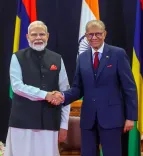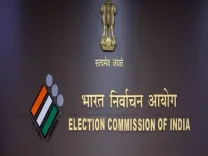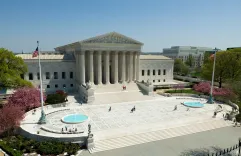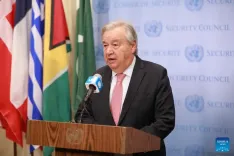2024 in Jammu and Kashmir: A Landmark Year for Participatory Elections and Enhanced Security
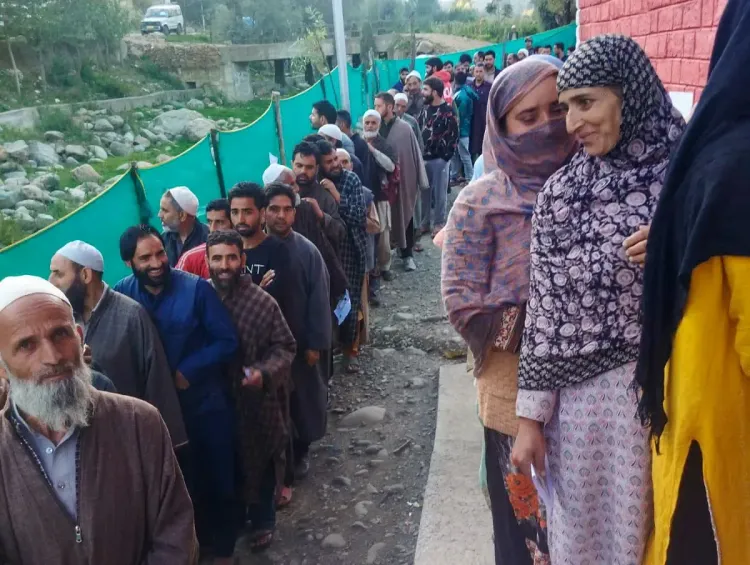
Srinagar/Jammu, Dec 30 (NationPress) The year 2024 has emerged as a transformative and historic chapter in Jammu and Kashmir, characterized by the occurrence of Lok Sabha and Legislative Assembly elections for the first time in a decade.
These elections were conducted in a peaceful manner, with significant public participation. Citizens actively selected their representatives for both the national Lok Sabha and the union territory's Legislative Assembly in an atmosphere that was notably free and fearless.
The successful and fair execution of these elections can be credited primarily to the Election Commission of India; however, the on-ground success can largely be attributed to the effective governance of Lt Governor Manoj Sinha.
Manoj Sinha has maintained a strong yet composed leadership style, firmly believing in the necessity of an elected government in J&K. His focused attention on enhancing the security landscape allowed citizens to engage in the democratic process without the shadow of terrorism.
The substantial voter turnout, even exceeding numbers recorded during more peaceful times prior to the onset of terrorism in Kashmir, is a testament to Manoj Sinha’s efforts.
Importantly, Sinha’s perspective on security extends beyond merely counting terrorist casualties. He emphasizes dismantling the entire terror ecosystem, which includes terrorists, their over-ground workers (OGWs), and sympathizers.
He is recognized as the first Lt. Governor of J&K to address the dismantling of this broader terror framework instead of purely focusing on annual terrorist fatalities.
His background in politics, an education from an IIT, and strong administrative skills are pivotal in understanding the rapidly evolving situation in Kashmir.
While the position of Lt Governor is not an elected office, his contributions to security and administration are vital, often likened to the role of an unsung hero.
The unwavering dedication and sacrifices made by local police, military personnel, and CAPFs have been instrumental in facilitating the highest number of tourists in Kashmir in 2024.
Significantly, there were no terrorist assaults on tourists or the over five lakh pilgrims participating in the annual Amarnath Yatra in the picturesque Kashmir Himalayas this year.
Local law enforcement and military forces worked tirelessly to ensure peace in J&K.
Despite facing numerous internal challenges, Pakistan has not relented in its malicious sponsorship of terrorism in J&K throughout 2024, employing funds, drugs, weaponry dropped by drones, and religious manipulation to sustain terrorist activities.
The peaceful, participatory elections were closely observed by diplomats from the international community, thwarting the efforts of terrorism operatives in Pakistan. In response, terrorists in J&K were commanded to assert their presence through attacks on military, police, CAPFs, and civilians as a desperate measure to reinvigorate a failing terrorist agenda.
The most severe incident occurred on October 20, when two armed assailants, one a Pakistani mercenary and the other local, infiltrated a workers' camp for an infrastructure project in Gagangir, Ganderbal, resulting in the tragic deaths of seven individuals, including six civilian workers and a local physician.
This infrastructure initiative aimed to construct a tunnel that would keep the tourist destination of Sonamarg accessible year-round, thus bolstering employment and tourism in the region.
The recruitment of locals into Pakistan-sponsored terror factions was notably low, with only four individuals joining these groups in 2024.
In various encounters and operations, security forces successfully eliminated approximately 75 terrorists across the state, including in both the Jammu region and Kashmir valley, as well as during infiltration attempts at the Line of Control (LoC), according to official reports.
It is crucial to note that Pakistan has long been recognized as a major hub for exporting terrorists globally, with a particular focus on India.
In 2024, Pakistan attempted to escalate terrorism in Jammu; however, the activities of its terrorists in various districts, including Rajouri, Poonch, Doda, Kishtwar, Kathua, and Reasi, were curtailed by increased troop deployments and filling the void left by the withdrawal of Rashtriya Rifles for border deployments with China.
Army Chief General Upendra Dwivedi and Northern Army Commander Lt General M.V. Suchendra Kumar have prioritized the eradication of terrorism in areas under the White Knight Corps.
Since the National Conference (NC) government led by Omar Abdullah took office, tensions have arisen between the Raj Bhavan and the Chief Minister due to the lack of an elected government capable of navigating the current situation in J&K.
J&K is no longer the fully autonomous state that Omar Abdullah or his predecessors governed; it is now a union territory. Understanding this constitutional change is crucial for the elected government and the well-being of the people.
The Lt Governor possesses inherent powers over the IAS/IPS, Police, Security, law & order, anti-corruption, prosecution, and prisons, including the authority to appoint the advocate general and government counsels representing the UT.
All other sectors, such as health and medical education, public works, electricity, education, irrigation and flood control, forestry and environment, social welfare, rural development, revenue, finance, tourism, agriculture, horticulture, and development authorities, are under the direct jurisdiction of the elected government in J&K.
Once the Chief Minister and his cabinet comprehend the delicate balance of power between their roles and those of the Lt. Governor, J&K can evolve into a truly peaceful and prosperous region by 2025.
The restoration of statehood will occur at the appropriate time, which requires patience from all stakeholders.


